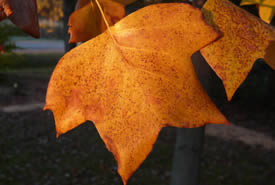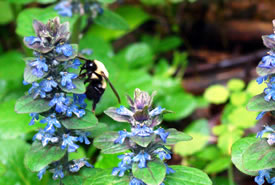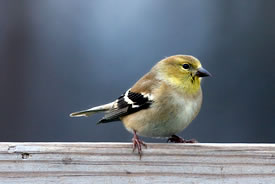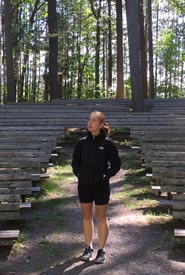Leave those leaves on the ground

Tuliptree leaf in fall (Photo by Bernt Solymar)
As a child, I heard somewhere that if you catch a leaf as it falls from a tree, it’s good luck. So, naturally, I spent most autumns staring up at the huge trees in the conservation area behind my house, waiting patiently for a leaf to dance down from the canopy above. When I would spot one, I would sprint after it, often missing it as it twisted in the breeze and fell to the forest floor.
These leaves on the ground may not have seemed lucky to six-year-old me, but for backyard biodiversity, they are extremely valuable.
According to Samantha Knight, program manager for the Weston Family Science program at the Nature Conservancy of Canada, property owners who haven’t raked and bagged their leaves already can avoid back-breaking yard work by leaving a layer or two of leaves on the ground.

A bee pollinating a plant from the mint family (Photo by NCC)
This small act of conservation can make a big difference for native pollinators, birds and other backyard wildlife.
Many animals, such as toads, frogs and some moths and butterflies, have adapted to hibernate in the leaf litter. The leaves provide an insulating blanket, which can help protect these animals from the cold and temperature fluctuations during the winter.
Many species of insects also need plants stalks or dead branches for hibernation. By completely cleaning up our gardens and yards, we may be removing important wintering habitats for native wildlife in our communities.

American goldfinch (Photo by Bill Hubick)
Migratory and resident birds will also be thankful. Fruits and seeds that remain on flowers and shrubs are a crucial food source and sustain many songbirds, such as goldfinches, jays and chickadees. Insects overwintering in our yards also provide an important food source for birds. Providing food and habitats for our native birds and insects is just as important during the fall and winter as the spring and summer.
Another benefit of not raking your leaves is soil improvement. As leaves break down, they transform into a natural mulch, which helps enrich the soil and suppress weeds. Thick piles of leaves can impact the growth of grass and other plants come spring, but leaving a light covering can improve the health of our gardens and lawns.
Today, instead of chasing leaves as they fall and keeping them in old coat pockets for my mom to find, I’m keeping them where they belong: on the ground. While my yard is painted yellow, orange and red as the trees go bare, I know I’m doing my small part for the wildlife that I share this space with.


